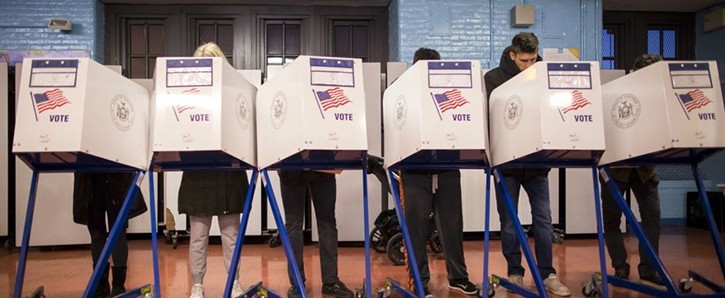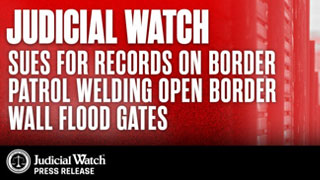

Judicial Watch Files Supreme Court Amicus Supporting Ohio’s Right to Clean Voter Rolls


Judicial Watch Attorney Robert Popper and Five Other Former DOJ Civil Rights Division Attorneys Also File Supreme Court Amici Brief
(Washington, DC) – Judicial Watch announced today it filed an amicus curiae brief in the U.S. Supreme Court in support of Ohio’s efforts to ensure that its voter rolls are up to date. The case is on appeal from the United States Court of Appeals for the Sixth Circuit, which held Ohio’s process is in violation of the National Voter Registration Act of 1993 (NVRA) (Jon Husted, Ohio Secretary of State v. Philip Randolph Institute, et al. (No. 16-980)).
In filing its amicus brief in support of Ohio’s voter registration law, Judicial Watch argued that the Sixth Circuit’s 2-1 ruling would undermine the 2014 settlement agreement between Judicial Watch and its litigation partner, True the Vote, and the State of Ohio (Judicial Watch and True the Vote v. Ohio Secretary of State Jon Husted (No. 2:12-cv-00792)). The settlement agreement required Ohio to contact inactive voters every year to confirm they had not moved or died, as one of many steps to fulfill Ohio’s voter list maintenance obligations under the NVRA. In that lawsuit, Judicial Watch and True the Vote alleged violations of the NVRA by the State of Ohio.
In its amicus brief to the Supreme Court, Judicial Watch argues that in preventing Ohio from cleaning its voter rolls, the lower court “inverted the plain meaning” of the federal voter list integrity law. Judicial Watch contends that Ohio should be permitted to continue its process of “sending of a statutory confirmation notice to any registrant that has not had any voting-related activity for two years.” Judicial Watch further argues:
After that, the registrant may be removed from the rolls if there is no response or further activity for two general federal elections. … [T]he failure to vote only leads to the sending of a notice. Subsequent removal is due to the failure to respond to that notice for a period of time that may extend up to four years. The Sixth Circuit’s attempt to argue otherwise relies on a misuse of the plain language of the NVRA.
Judicial Watch’s amicus brief also argues that the Sixth Circuit ruling would adversely affect its settlement agreement with Ohio were it allowed to stand:
In January of 2014 the parties settled the lawsuit, agreeing to terms for Ohio to perform certain NVRA Section 8 list maintenance practices through November 2018. A key provision of this Settlement Agreement was Ohio’s agreement to perform an annual list maintenance “Supplemental Mailing” to voters who had no contact with Ohio’s election offices in two years. The Settlement Agreement required Ohio to send the Supplemental Mailing every year, whereas Ohio had previously been sending the mailing every two years. The Supplemental Mailing portion of the Settlement Agreement was so important to the parties that they subsequently negotiated an amendment solely to give Ohio greater flexibility over which month of the year to initiate the Supplemental Mailing.
Judicial Watch never would have agreed to the Settlement Agreement with Ohio and dismissed its lawsuit if it believed that the Supplemental Mailing was legally impermissible. If the Sixth Circuit’s ruling in this case is allowed to stand, this key provision of Judicial Watch’s Settlement Agreement could be voided.
Judicial Watch Attorney Robert Popper, the director of the organization’s Election Integrity Project, has also joined with five other former attorneys of the Civil Rights Division Attorneys of the Justice Department to file an amici curiae brief in the Husted case. In their brief, Popper and his associates argue:
[T]he Sixth Circuit’s interpretation of the NVRA conflicts with its text, structure, and history. Amici have long interpreted the statute oppositely, and they helped the Justice Department negotiate settlements that would be illegal under the Sixth Circuit’s view. [Emphasis added] Second, the Sixth Circuit’s decision deprives Ohio and other jurisdictions of an important means to combat bloated voter rolls, a real and pressing threat to the integrity of federal elections.
***
The NVRA has two main goals: maximizing the number of eligible citizens on the voter rolls and minimizing the number of ineligible citizens on the voter rolls.
“The Obama Justice Department and its allies on the Left were fanatical in their efforts to undermine election integrity measures like the efforts to keep clean voter lists in Ohio,” said Judicial Watch President Tom Fitton. “Dirty election rolls mean dirty elections. The Supreme Court should reverse the Sixth Circuit decision and allow the Ohio to continue to ensure that dead people, those who have moved to other states, and other ineligible names are removed from its voter registration lists.”
Judicial Watch’s Election Integrity Project has found that many states have more individuals on their voting rolls than those eligible to vote.
###














